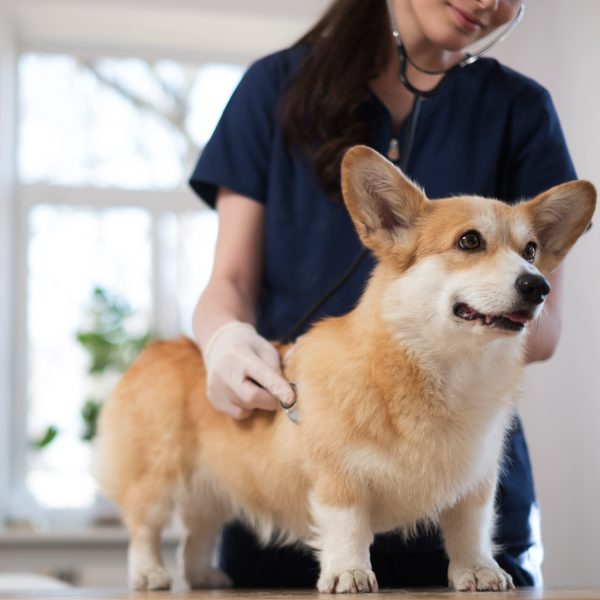What to Know About Gastritis in Dogs

It’s always scary when your dog is sick. If you are noticing excessive vomiting in your dog, it could be gastritis, an inflammation of the stomach lining. There are different types and causes of canine gastritis. Here’s what to know about gastritis in dogs:
What is Gastritis in Dogs?
If you’re asking yourself, “Why is my dog vomiting?”, gastritis might be the cause. Gastritis is defined as an inflammation of the stomach and its lining. It is accompanied by episodes of vomiting and lack of appetite.
When the stomach lining is working the way it is supposed to, the mucosal lining protects against bacteria, acidity, changes in temperature, and detergents. When the stomach lining is inflamed, it cannot do its job properly.
3 Major Types of Gastritis in Dogs
There are a few different types of gastritis in dogs. It can be acute or chronic, depending on the causes and symptoms.
Hemorrhagic Gastritis in Dogs
Hemorrhagic gastritis is characterized by bloody diarrhea and vomiting. Dogs may have a fever, lethargy, lack of appetite, and a painful stomach. It usually occurs with no warning.
Reflux Gastritis in Dogs
Also known as gastroesophageal gastritis, reflux gastritis is defined by the flow of gastric acid from the stomach back into the esophageal tube. This type of gastritis is a little harder to diagnose because the symptoms can be confused with other conditions. The most common symptoms are drooling, burping, foul-smelling breath, and vomiting.
Acute Gastritis in Dogs
Acute gastritis can occur frequently in dogs, presents as vomiting, and comes on very quickly. It can be caused by many things like bacteria, toxins, after eating grass, cat litter, spoiled or tainted food, and foreign objects. It can also be caused by feeding your dog table scraps that don’t agree with them.
What Are the Symptoms of Gastritis in Dogs?
The most common symptoms of gastritis are vomiting and diarrhea. Dogs may also have a sore abdomen and foul-smelling breath. Dehydration or increased thirst and decreased appetite are also common symptoms.
Acute gastritis symptoms will come on quickly and typically only last for about 24 hours. But chronic vomiting is one of the symptoms you should never ignore in your dog. If symptoms last longer than a couple of days, contact your vet to schedule an appointment.
How to Test For Gastritis in Dogs
Your veterinarian will go over your dog’s symptoms with you to know how best to proceed with testing. They will first rule out any food reactions, foreign objects, or ingestion of garbage or plants.
Next, your vet will run tests, such as a blood test, urinalysis, or stool sample. If there is a possibility of an ingested foreign object, they may do an x-ray to investigate. If your vet suspects an allergy to a food, they will suggest a gradual diet change to pinpoint the allergy.
Your vet will also check for more serious and underlying causes or conditions. Acute and chronic vomiting is enough to diagnose gastritis on its own, but running tests will help best determine the course of action.
How to Treat Gastritis in Dogs
Treatment of gastritis can vary, depending on the cause and symptoms. Acute gastritis often resolves on its own within 24 to 48 hours. Guidelines for treating acute gastritis include no food for 24 to 48 hours, introducing a bland diet of foods that are easy to digest, such as rice, and smaller meals throughout the day. Over the next few days, slowly introduce your dog’s regular food if that is not the cause of their gastritis.
If your dog’s gastritis is caused by something more serious or is chronic, your vet can prescribe anti-emetic medication to help prevent vomiting. If your dog is dehydrated, they may need a fluid infusion to help rehydrate them. If stomach ulcers are present, your vet may prescribe antacids to help your dog’s stomach heal.
What Causes Gastritis in Dogs?
Dogs are often prone to gastritis because they are not always good at discerning what is safe to eat or not. There are toxic foods for dogs that don’t agree with them, and sometimes they eat plants or garbage. It can be caused by overeating or eating too fast, which many dogs are prone to.
How to Prevent Gastritis in Dogs
There’s no easy answer to preventing gastritis in your dog. The best way to prevent gastritis is to be aware of what your dog is ingesting. If your dog is eating too quickly, you implement some different tactics to stop a dog from eating too fast.
A slow feeder bowl is one of the simple and easy ways to get them to slow down during mealtimes. However, even if you do everything right and watch what your dog eats, they still may develop a case of gastritis at some point.
This is an overview of what to know about gastritis in dogs. If your dog develops any of the symptoms, don’t hesitate to talk to your veterinarian. They will help you determine the best course of action and get your pup back to feeling better soon!
